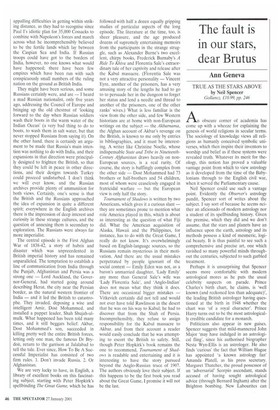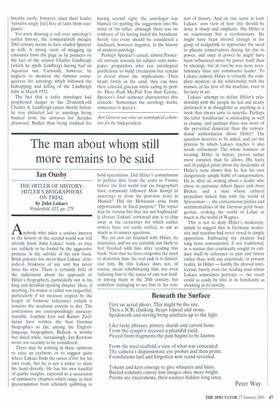The fault is in our stars, dear Brutus
Ann Geneva
TRUE AS THE STARS ABOVE by Neil Spencer
Gollancz, £10.99, pp. 246
All obscure corner of academia has come up with a wheeze for explaining the genesis of world religions in secular terms. The sociology of knowledge views all religions as humanly conceived symbolic universes, which then inspire their inventors to worship and belief as if these systems were revealed truth. Whatever its merit for theology, this notion has proved a valuable vantage point from which to view astrology as it developed from the time of the Babylonians through to the English civil war, when it served the Parliamentary cause.
Neil Spencer could use such a vantage point. Evidently the Observer's astrology pundit, Spencer sort of writes about the subject. 1 say sort of because he seems neither an aficionado of modern astrology nor a student of its spellbinding history. Given the premise, which they did and we don't assume, that the stars and planets have an influence upon the earth, astrology and its methods possess a kind of mesmeric, logical beauty. It is thus painful to see such a comprehensive and precise art, one which ravished so many powerful minds throughout the centuries, subjected to such garbled treatment.
Perhaps it is unsurprising that Spencer seems more comfortable with modern astrological mores as he puts the usual celebrity suspects on parade. Prince Charles's birth chart, he claims, is 'well known (and reckoned less than adequate)', the leading British astrologer having questioned at the birth in 1948 whether the chart was 'of a royal character'. Prince Harry turns out to be the most astrologically credible candidate for a monarch.
Politicians also appear in new guises. Spencer suggests that mild-mannered John Major 'may have indulged in an astrological fling', since his authorised biographer Nesta Wyn-Ellis is an astrologer. He also finds 'curious' the fact that William Hague has appointed 'a known astrology fan' Amanda PlateII, as his press secretary. Margaret Thatcher, the proud possessor of an 'adversarial' Scorpio ascendant, stands accused of having sought astrological advice (through Bernard Ingham) after the Brighton bombing. New Labourites can breathe easily, however, since their leader 'remains singly [sic] free of taint from stargazers'.
Yet even drawing a veil over astrology's earlier history, the comparatively meagre 20th century seems to have eluded Spencer as well. A strong scent of mugging up emanates from the page as he pounces on the fact of the aviator Charles Lindbergh (which he spells Lindberg) having had an Aquarius sun. Curiously, however, he neglects to mention the famous consequences for astrology which followed the kidnapping and killing of the Lindbergh baby in March 1932.
The fact that a radio astrologer had prophesied danger to the 20-month-old Charles A. Lindbergh junior shortly before he was abducted led to astrology being banned from the airwaves for decades afterward. Rather than being credited for
having second sight, the astrologer was blamed for putting the suggestion into the mind of the killer, although there was no evidence of his having heard the broadcast. Surely this event should be considered a landmark, however negative, in the history of modern astrology.
Perhaps Spencer's casual, almost Pooterish attitude towards his subject suits newspaper proprietors who run astrological predictions to build circulation but remain in denial about the implications. Their heads firmly in the sand, they can have their celestial gateaux while eating its profits. More Push Me-Pull You than Eeyore, • Spencer's final sentence characterises this attitude: 'Sometimes the astrology works, sometimes it doesn't.'
Ann Geneva was once an astrological columnist for the Independent























































































 Previous page
Previous page